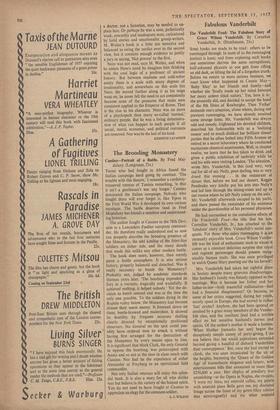The Brooding Monastery
Cassino—Portrait of a Battle. By Fred Maj- dalany. (Longmans, 21s.) THOSE who had fought in Africa found the Italian campaign hard going by contrast. 'The trouble with this theatre,' I remember a corduroy- trousered veteran of Tunisia remarking, 'is that it isn't a gentleman's war any longer.' Cassino dominated the Italian campaign. Nobody who fought there will ever forget it; like Ypres in the First World War it developed its own curious mystique. The battle deserves (and in Fred Majdalany has found) a sensitive and understand- ing historian.
The author fought at Cassino in the 78th Divi- sion as a Lancashire Fusilier company comman- der. He therefore really understood and so now can properly describe the brooding presence of the Monastery, the odd kinship of the front-line soldiers on either side, and the many details that made this unlike any other modern battle.
The book does more, however, than merely paint a battle atmosphere. It is also serious history, properly balanced and detached. Was it really necessary to bomb the 'Monastery? Probably not, judged by academic standards thirteen years later. The bombing expended its fury in a vacuum, tragically and wastefully. It achieved nothing, it helped nobody.' Yet the de- cision to bomb seemed and was at the time the only one possible. To the soldiers dying in the Rapido valley below, the Monastery had become almost their worst enemy. It frowned down on them, beetle-browed and malevolent. It showed its hostility by frequent accurate shelling clearly directed by exceptionally positioned observers. No General on the spot could pos- sibly have ordered men to attack it without having first arranged for the destruction of the Monastery by every means open to him. It is significant that Mark Clark, the only General to oppose the bombing, was preoccupied with Anzio and so not at the time in close touch with Cassino. Nor had he the experience of either Alexander or Freyberg as an operational field commander.
Not only Italian veterans will enjoy this splen- did book. It is also a story for all who dislike war but believe in the victory of the human spirit. You do not need to have fought at Cassino to appreciate an elegy for the common soldier.
A. J. WILSON


































 Previous page
Previous page